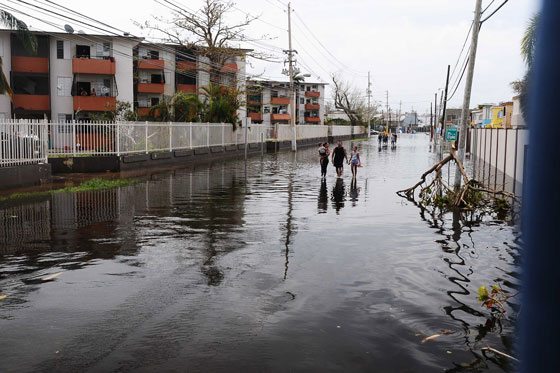
October 30, 2017; The Nation
By now, those of us who have been tracking the developments in Puerto Rico since Hurricane Maria, and perhaps since the fiscal crisis, have heard about the Federal Oversight and Management Board, the seven-person team appointed to restructure the island’s debt. But we may not know Clayton Gillette of New York University Law and David Skeel Jr of University of Pennsylvania Law, the legal theorists behind “Dictatorships for Democracy,” an approach which advocates takeover boards for bankrupt communities.
As Simon Davis-Cohen, writing for The Nation, observes, the theories being applied to Puerto Rico have also been applied at the municipal level to Detroit, Flint, and Atlantic City, “where elected local governments have been suspended in favor of financial overseers tasked with imposing regimes of economic austerity.” Davis-Cohen notes, “The effect of financial oversight after Hurricane Maria is that the elected Puerto Rican government can neither spend money to revitalize the island’s public services nor can it provide basic disaster recovery or a rigorous jobs program without the board’s approval.”
Puerto Rico’s humanitarian catastrophe is caused by a federal government that encourages debt (by allowing people to lend money to the island, but not allowing the island to collect taxes without which it’s practically impossible to pay the debt), poverty (created and maintained by an extraction economy), and population decline (people leaving the island looking for economic opportunity on the mainland). At the root of the antidemocratic approach outlined by Gillette and Skeel is “the idea that the elected government in any given crisis is to blame for the economic distress.”
In Methodology of the Oppressed, Chela Sandoval breathes life into one of communications theorist Roland Barthes’ last essays, in which he proposes a “rhetoric of supremacy” that revolves around seven principles. This framework reveals the dominant ways of thinking through which oppression operates. One of these principles is “the privation of history,” which “works by distancing all objects in culture from the material history of what has made them what they are, an estrangement that deprives (Western) consciousness of any responsibility for what has and will become.” We are seeing this in Puerto Rico, and it conveniently leads to conditions where the causes of the problem are also the solution. In this case, the investor takeover of Puerto Rico is “solved” with more investor takeover.
Gillette and Skeel began to outline their legal argument in a 2014 paper, published in 2016 in the Yale Law Journal, titled “Governance Reform and the Judicial Role in Municipal Bankruptcy.” In it, they propose that “governments ought to be treated like private corporations when they go bankrupt” because they are both “vehicles for providing goods and services.”
When a private corporation goes bankrupt, judges can make permanent reforms to the corporation’s governing structure…But judges don’t have the same power to restructure bankrupt cities and towns.
[…]
Creditors, they argue, should be able “to dislodge the current governance structure” during times of fiscal crisis. Skeel and Gillette offer judges, financial overseers, and politicians a new language that they can use; pensioners become “shareholders” of the local government, and are treated the same as profit-motivated creditors.
Sign up for our free newsletters
Subscribe to NPQ's newsletters to have our top stories delivered directly to your inbox.
By signing up, you agree to our privacy policy and terms of use, and to receive messages from NPQ and our partners.
Underlying their thinking is the assumption, stated by Skeel, “that when a public entity is in deep financial distress there is almost always some government dysfunction connected with it.”
In a 2015 op-ed in the New York Times, Gillette and Steel advocated for the federal government to create a control board to turn around Puerto Rico’s finances. Nine months later, Obama signed the act that created the fiscal control board and “effectively removed the financial powers of the Puerto Rican government and the autonomy of its 78 municipalities.” Two months later, Skeel himself was appointed to the board. It is important to note that the supremacy principles outlined by Barthes “tempt, inhabit, and shape not only the most obedient and deserving citizen-subject, but also the most rebellious agent of social change.” We may recoil at Trump’s response to Puerto Rico’s collapse, but Obama helped lay the political and legal foundation for it.
In another 2014 essay by Gillette titled “Dictatorships for Democracy: Takeovers of Financially Failed Cities,” he argues that such boards can “catalyze reform that makes the entity more democratic and responsive…but you go through a process that is not democratic.” This makes no logical sense, but it exhibits another one of the seven supremacy principles: “tautology,” or speech that operates behind a badge of authority, where rationality is hidden. Sandoval writes, “This redundant, superficial figure depends for its influence on power itself, which it uses to freeze meaning into place, thereby protecting and legitimizing what is.”
One of the undemocratic moves the fiscal control board took was the dismantling of the Banco Gubernamental de Fomento para Puerto Rico (Puerto Rico Government Development Bank), “the ‘financial nerve center’ of the island, providing key financial services to the island’s cities and government agencies.” San Juan fought back with a lawsuit that claimed,
The way the GDB is being dismantled disempowers local governments by lumping them in with the rest of the bank’s creditors. The municipalities—given one vote each—are being outvoted. As a result, millions of dollars of municipal-tax revenue that the GDB held in trust will be taken from the municipalities “to pay all of GDB’s creditors, including public bondholder.”
However, a federal judge recently rejected San Juan’s claim. But, as David-Cohen points out,
Even laying aside the undemocratic nature of oversight boards, the solutions they impose on populations are often painful and ineffective… According to local-government expert Michelle Wilde Anderson of Stanford University Law, when fiscal problems are caused by chronic poverty, population decline, and the federal government’s encouragement of debt, the situation won’t be fixed “with better spreadsheets or fiscal tools.”
[…]
When poverty, postindustrial decline, and population loss (or a hurricane) are the sources of economic crisis, you can’t blame the government, and therefore suspending it becomes less justified.
Davis-Cohen concludes, “Puerto Rico should be a cautionary tale for the mainland Unites States…Gillette told me, ‘Puerto Rico’s municipalities are facing the same issues that confront cities [on the mainland].’” Melissa Mays, Flint resident and founder of the group Water You Fighting For?, offers a retort: “The more democracy we lose, the more lives are lost.” Don’t let this happen in your town!—Cyndi Suarez













